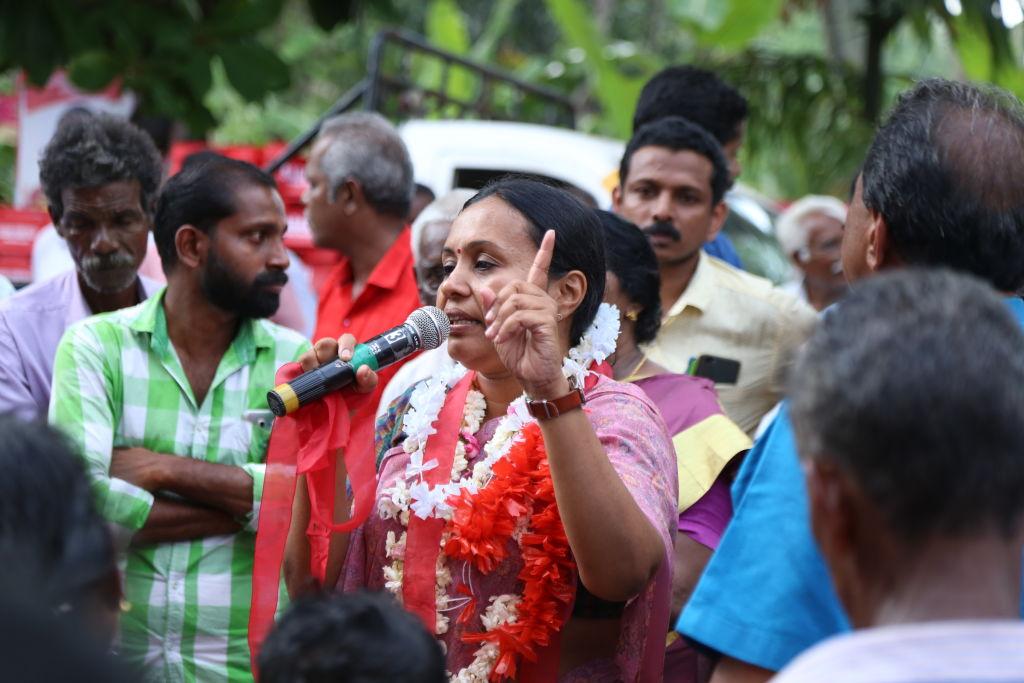The women, peace and security update
Posted By Tracy Beattie, Hal Crichton-Standish, Daria Impiombato, Alexandra Pascoe and Albert Zhang on February 12, 2020 @ 13:07

Progress and setbacks in WPS national action plans
While India initially extended its support for UN Security Council resolution 1325 in 2000, its failure to adopt a national action plan is undermining the country’s stated commitment to the WPS agenda. The Indian government has failed to integrate the WPS agenda [1] into national security and defence policies or implement schemes for the advancement of women in these areas. India’s reluctance to more fully embrace resolution 1325 at the national level seems to derive from its desire to prevent perceived international interference in domestic affairs.
South Africa has made [2] women’s empowerment a policy platform of its upcoming term as chair of the African Union. While this is a positive sign for the WPS agenda in Sub-Saharan Africa, the region continues [3] to lag behind the global average in addressing gender inequality. In particular, addressing sexual harassment and violence against women is a critical challenge for the region. In 2009, only 28% of countries in Sub-Saharan Africa had laws on domestic violence. While that figure has since increased to 55%, nearly half of all countries in the region still lack specific laws dealing with the most widespread form of sexual harassment and violence.
Mexico has become [4] the third country to incorporate feminist perspectives in its foreign policy. The International Center for Research on Women [5] defines feminist foreign policy as government policy that ‘prioritizes gender equality and enshrines the human rights of women and other traditionally marginalized groups’. The Mexican government has a broad vision for its new policy and intends to advance a feminist agenda, achieve gender parity in the foreign ministry, combat gender-based violence, make equality visible, and practise ‘intersectional feminism [6]’.
Integrating a gender perspective into UN inquiries
The London School of Economics’ Centre for Women, Peace and Security [7] hosted a workshop for international scholars, practitioners and experts to explore how commissions of inquiry and other UN fact-finding missions can more effectively integrate a gender perspective into their work. While inquiries often refer to the impact of conflict on women and girls, and men and boys, applying a more rigorous gender analysis would enable them to uncover the structural and systemic conditions which contribute to sexual and gender-based violence and conflict. Moving away from equating ‘gender’ with ‘women’, recognising the intellectual complexity of gender analysis, and actively and self-critically applying it, were key recommendations that came out of the workshop.
India’s women politicians abused by trolls
Amnesty International [8] conducted a study during India’s 2019 election, tracking Twitter mentions of 95 women politicians. Results, reported by CNN [9], show that one in seven tweets was abusive or problematic. While political trolling is a global phenomenon, harassment is particularly bad in India and affects mainly women. Amnesty suggests that this represents a significant barrier to women entering politics, and that women from certain political parties, such as the Indian National Congress, seem to be targeted more than others. Authorities’ response to the problem has been weak, as India doesn’t have specific laws that address online crimes against women.
Mobilising men as WPS allies
This article [10] by Donald Steinberg examines the ‘Mobilizing Men as Partners for Women, Peace and Security [11]’ initiative and highlights the need for men to strengthen their role as allies of the WPS agenda. He notes that most male allies are driven by the utilitarian belief that engaging women in peace and security processes helps produce new insights, boost participation and build communities. He argues that ensuring full and meaningful empowerment of women in international security requires a shift towards a more rights-based and equitable approach, while issues like sexism, toxic masculinity and intersectionality are addressed simultaneously.
Aligning the WPS and R2P agendas for conflict prevention
The WPS agenda and the responsibility to protect (R2P) should be better aligned to increase effective participation and leadership of women and girls in conflict prevention, according to Jessica Roland and Marijke Kremin [12]. They argue that the International Commission on Intervention and State Sovereignty, which originally conceptualised [13] the R2P norm, has failed to integrate gender-based components into the norm’s development. For the WPS agenda to move forward, the experiences, expertise and perspectives of women and girls must be included in conflict-prevention efforts, such as identifying potential sources of conflict, peace negotiations, humanitarian responses and post-conflict recovery.
Yemen’s Houthi rebels silence women
Fatima Abo Alasrar, a non-resident scholar at the Middle East Institute, argues [14]that since the 2014 overthrow of the official Yemen government, the Houthi militia has violated women’s rights, despite customary or tribal norms against such behaviour. The most recent incident involved an attack [15]on activist Ebtisam Abu Dunya after she embarrassed the Houthi authorities. Women were included in the 2013 Yemen national dialogue to carve out a gender-equal future, but Alasrar fears that those rights are now unattainable.
Article printed from The Strategist: https://aspistrategist.ru
URL to article: /the-women-peace-and-security-update/
URLs in this post:
[1] failed to integrate the WPS agenda: https://thediplomat.com/2020/01/a-lukewarm-commitment-india-and-gender-equality-in-security-affairs/
[2] made: https://allafrica.com/stories/202001280789.html
[3] continues: https://www.un.org/en/africa/osaa/peace/women.shtml
[4] become: https://foreignpolicy.com/2020/01/14/mexican-diplomacy-feminist-foreign-policy/?fbclid=IwAR3a_baa-j_FI8jVl1aU_rI18il0lcwNoAwjk6-KbpOZUX8D6ivphAaV5BA
[5] International Center for Research on Women: https://www.icrw.org/publications/defining-feminist-foreign-policy/
[6] intersectional feminism: https://iwda.org.au/what-does-intersectional-feminism-actually-mean/
[7] Centre for Women, Peace and Security: https://blogs.lse.ac.uk/wps/2019/12/20/integrating-a-gender-perspective-into-commissions-of-inquiry/
[8] Amnesty International: https://amnesty.org.in/trolling-verified-troll-patrol-indias-findings-on-online-abuse-twitter/
[9] CNN: https://edition.cnn.com/2020/01/22/india/india-women-politicians-trolling-amnesty-asequals-intl/index.html
[10] article: https://www.justsecurity.org/67779/men-as-partners-for-women-peace-and-security-vital-lessons/
[11] Mobilizing Men as Partners for Women, Peace and Security: https://oursecurefuture.org/projects/mobilizing-men-wps
[12] according to Jessica Roland and Marijke Kremin: https://theglobalobservatory.org/2020/01/bridging-women-peace-security-responsibility-to-protect-in-conflict-prevention/
[13] conceptualised: http://responsibilitytoprotect.org/ICISS%20Report.pdf
[14] argues : https://insidearabia.com/iran-backed-yemeni-houthis-abuse-women-to-silence-opposition/
[15] attack : https://al-masdaronline.net/national/241
Click here to print.